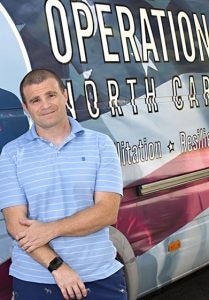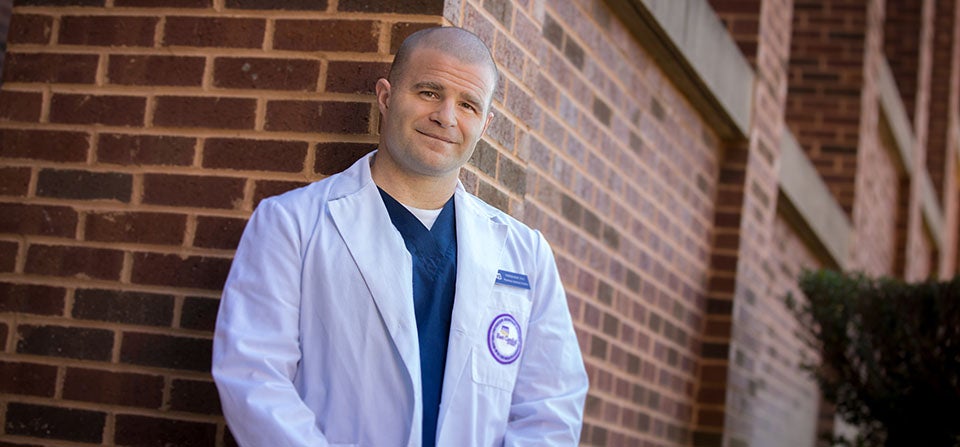Student: Foster Hunt
Foster Hunt serves veterans through the Navigate Counseling Clinic
![]()
College: College of Allied Health Sciences
Major: Physician Assistant Studies
Age: 32
Class: Graduate student
Hometown: Born in Hawaii, lived in Efland approximately 20 years
Clubs & Organizations: President of Physician Assistant Student Society, Navigate Clinic volunteer
Hobbies & Interests: Photography, cycling, hiking and traveling
![]()
Place on Campus: Lake Laupus
Hangout: Winslow’s Tavern
Place to Eat: Wasabi 88
Class: Genetics
Website: Reddit
TV Shows: “Breaking Bad”
Musicians/bands: AC/DC
Movie: “Zoolander”
![]()
Most Influential Professor: Dr. Thomas Lucier
You Can’t Live Without: Trips to the beach in the summertime
Role Model: My mother. She is a nurse and has worked in several areas of healthcare.
Words to Live By: “Semper Gumby” (always flexible)
Advice for fellow students: Ride your bike to class. It will eliminate a lot of stress trying to find a space to park and waiting in traffic leaving class at the end of the day.
Something cool about ECU you wish you knew during your first year: Where Panda Express is located

![]()
“My volunteering for the Mobile Clinic for Homeless Veterans was so perfectly timed because it started when I was in the throes of my first rigorous academic semester as a full-time student in PA school.
Although it seems like it could have been stressful, it was actually a blessing because it got me out of the classroom and off of campus and reminded me why I chose a path where I can work with veterans.”
– Foster Hunt
Service-learning projects are one of many requirements for first-semester physician assistant studies students in the College of Allied Health Sciences. But when PA student Foster Hunt wasn’t compelled by any of the usual sites for the assignment, he forged his own path.
Hunt earned an undergraduate degree from Appalachian State University in information technology before beginning five years of service in the U.S. Marine Corps, where he worked closely with doctors, medics and Navy corpsmen. After deployments to Iraq and Afghanistan, he sought more opportunities to work in field medicine and began to consider returning to school in the health sciences.
“It was never a far stretch for me to go to PA school,” said Hunt. “My mother’s a nurse, my aunt’s a nurse, and my great grandfather was a physician. There are pictures of me when I was little taking my mother’s blood pressure.”
Hunt chose to enroll in ECU’s physician assistant program because of its focus on providing healthcare to rural and high need areas. Hunt approached ECU clinical instructor Kim Stokes about working with the Navigate Counseling Clinic for his service-learning project. Because physician assistant studies and Navigate both seek to assist underserved populations, Hunt’s desire to work with a Navigate team serving veterans made perfect sense.
The clinic’s staff counsels individuals, families and groups through evidence-based and innovative interventions. Under ECU faculty supervision, services are provided by doctoral and master’s degree students from diverse educational and vocational backgrounds in the Department of Addictions and Rehabilitation Studies. The clinic offers a wide range of specialty services including addiction and clinical counseling, and complementary and alternative interventions such as biofeedback and telecounseling, rehabilitation counseling and veteran-specific counseling.
“It is my hope to be able to work with veterans in a rural setting once I graduate from PA school,” he said. “My hope in working with Navigate was to enhance my journey in that direction while I am here at ECU.”
One way Hunt has done that is by volunteering with the Mobile Clinic for Homeless Veterans, supported through a Substance Abuse and Mental Health Services Administration grant called Operation Re-entry North Carolina.
Transportation is a primary barrier to providing services for homeless veterans, so Navigate’s outreach efforts involve taking medical and counseling services to the vets through the mobile clinic – literally “meeting them where they are.” The unit is also equipped with satellite and telecounseling technology to provide services to veterans in more rural areas of Beaufort, Craven, Cumberland, Edgecombe, Nash and Onslow counties.
As part of his project, Hunt also visited soup kitchens and homeless shelters to locate veterans and point them in the direction of health services, including those offered by Navigate, other ECU departments and their local community.
“Some veterans see coming to a doctor’s office for mental care like they are sick or weak,” said Stokes, the PA Studies instructor who has worked closely with Hunt. “However, with a clinic like Navigate – which is located on an academic campus versus a clinic setting – and with the potential of the mobile initiative, this helps to break down those barriers to care.”
Collaborations like the one between the Department of Physician Assistant Studies and the Department of Addictions and Rehabilitation Studies are paving the way for more interdisciplinary learning experiences for ECU health sciences students, Stokes said. That workforce training will ultimately affect clinical practice in eastern North Carolina – improving access to care for the veterans and better clinical outcomes.
“Foster’s dedication to veterans and access to care is remarkable,” said Stokes.
“He could easily have chosen a well-established site to complete the compensatory hours. Instead, he chose to generate an entirely new plan of action based on where his heart is and he has really worked to make a difference in the lives of these veterans. I’m proud that we have students with that type of compassion and devotion.”
What was it like to volunteer while going to school full-time?
My volunteering for the Mobile Clinic for Homeless Veterans was so perfectly timed because it started when I was in the throes of my first rigorous academic semester as a full-time student in PA school. Although it seems like it could have been stressful, it was actually a blessing because it got me out of the classroom and off of campus and reminded me why I chose a path where I can work with veterans.
What sort of assistance did you provide the veterans?
There is something about being with veterans; we instantly connect in an unspoken way. Most of my time was spent listening to their stories – a powerful and rewarding experience for me. They understand that even though I may not have seen their specific piece of history, we can appreciate what each of us has been through.
Photography by: Cliff Hollis and Gretchen Baugh
Written by: Kelly Dilda
Contributions by: Summer Tillman
